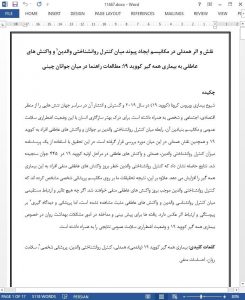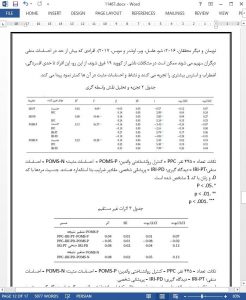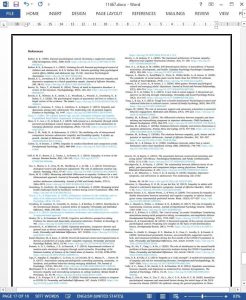Abstract
The outbreak of coronavirus disease 2019 (COVID-19) and its worldwide spread have brought economic, social and personal stress. To better understand human adjustments to this public health emergency and its underlying mechanism, the relationship between perceived parental psychological control in emerging adults and individual's emotional reactivity to COVID-19 as well as the role of empathy was examined. The study was conducted among 445 emerging adults using questionnaires measuring parental psychological control, empathy, and emotional reactivities in the initial stage of COVID-19. Results revealed that parental psychological control conferred risks for individual's increased negative emotional reactivity to this pandemic. Moreover, our findings shedlight on personal distress as a mechanism through which parental psychological control induces negative emotional reactivities. Although no direct effect between parental psychological control and positive emotional reactivity was found, personal distress and perspective taking mediate the association in an opposite way. Findings have implications for predicting and intervening mental health problems in COVID-19 pandemic and future public health emergency.
1. Introduction
The coronavirus disease 2019 (COVID-19) has become a public health emergency posing enormous challenges to governments, businesses, local communities, and general public (Greenberg, Docherty, Gnanapragasam, & Wessely, 2020; Wu & McGoogan, 2020). Due to threat to public health, prolonged activity restrictions, financial pressure, and other attendant adverse impacts, COVID-19 has triggered kinds of psychological problems of the general population, including symptoms of anxiety, depression, fear, and stress (Brooks et al., 2020; Mann, Krueger, & Vohs, 2020; Qiu et al., 2020; Wang et al., 2020; Zhang, Wang, Rauch, & Wei, 2020). Some dysfunctional personality characteristics, such as pessimism (Jovančević & Milićević, 2020), detachment (Somma et al., 2020) and alexithymia (Tang, Hu, Yang, & Xu, 2020), were confirmed to predict declines in mental health during the COVID-19 pandemic. As the situation is likely to continue for some time around the world, there is an urgent call for more attention to public mental health. Against this background, the current study aims to further explore the personal and family risk factors concerning the maladaptive emotional reactivities to COVID-19 pandemic.
5. Conclusion
This study examines the potential risk factors for declines in mental health during COVID-19 and represents a new attempt to explore the mediating role of empathy in the association between parental psychological control and emotional reactivity among emerging adults. A partial indirect effect of parental psychological control on the negative emotional reactivity through personal distress is found. The results surprisingly indicate that parental psychological control improves perspective taking abilities, which functions as a protective factor against the negative prediction of personal distress on positive emotion reactivity. The current findings contribute to a better understanding of empathy development and its effect on mental health problems in COVID-19. It also provides some thoughts for conducting effective measures to protect individuals from adverse psychological impacts during the current coronavirus disease and future public emergency.










